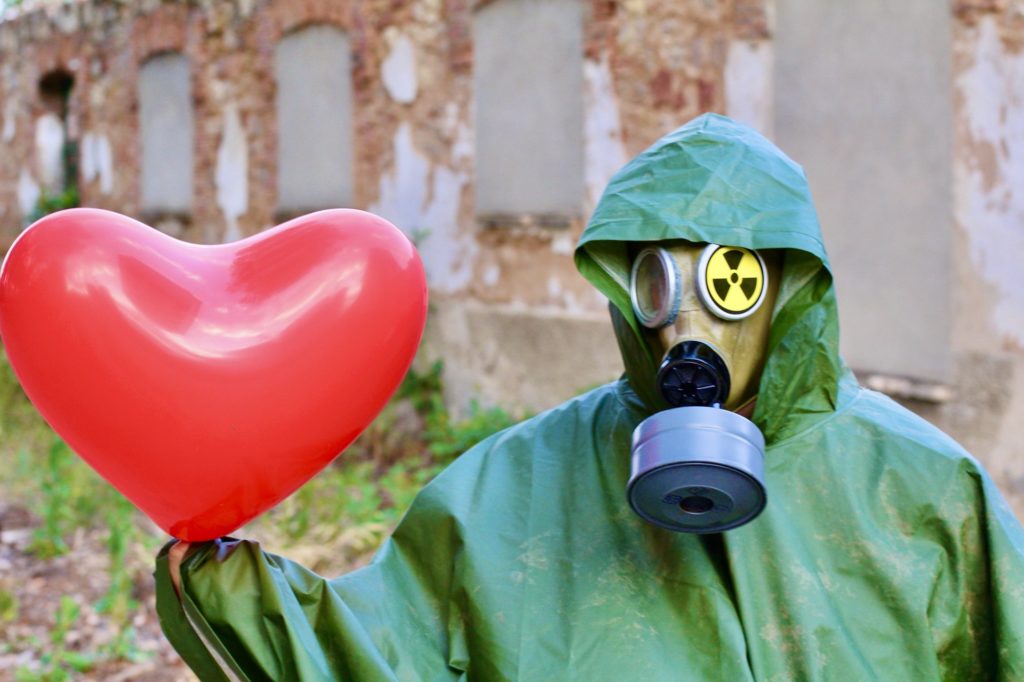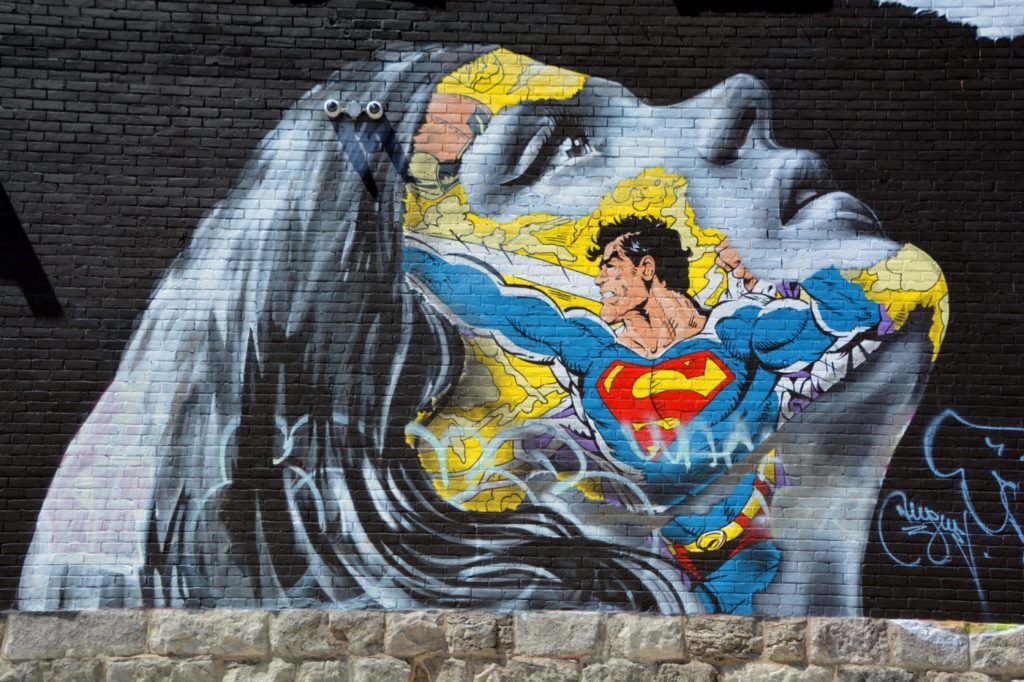
We are living in strange times. Yesterday I caught myself scanning a neighbor’s eyes. I was searching for crow’s feet, a sure-fire way to determine whether a smile resided behind their surgical mask. That evening, I ran into an acquaintance while finishing last-minute Christmas errands and bumped into the (now familiar) force field that amplifies social awkwardness and routinely has me fumbling with how to greet a friend. Dare we hug? Shake hands? Nod and flash our invisible smiles? For almost two years, the bulk of my relationships have been reduced to text, Zoom, or email; I’m forced to rely on a smattering of clues to deduce who is a friend and who is a foe. And increasingly, I hear my internal alarm bell sound. I fear that my ability to answer this simple question accurately is becoming significantly impaired. Of equal concern, I have growing worries that everyone around me is afflicted with this same curse — that I am chronically at risk of being misread, misunderstood, and in turn, plagued by constant misattunements. They are everywhere it seems, these little false starts, moments aspiring to find a connection; they sputter, gasp and spark, then fall limp to the ground. This evening clued me into the graveness of the situation. Four relatively normal things happened in quick succession of one and another. And while each of these things in and of themselves might seem unremarkable, when I place them into the context of who I fancy myself to be and who I like to think I am not, they begin to paint an overall worrying picture.
First, I burned the onions. I was sauteing them in olive oil as I prepared dinner, and I charred them beyond repair. It’s worth noting that I had no backup onions if dinner went awry. This is significant because a) I never burn onions, and b) I never run out of staples like onions. In fact, since the onset of COVID, I’ve taken to hoarding a surplus of food. So much so that I had to expand my office into a pantry. On my bookshelves, you can find the complete works of C.S. Lewis, powdered milk, a box of self-sealing envelopes, and two months’ worth of organic chunky peanut butter. Yet, somehow I managed to run out of onions.
Second, I attempted to attend an online Winter Solstice gathering via Zoom. There were 7000 participants. I say attempted because it was nearly impossible to hear the conference over the onions’ sizzling and the deafening roar of my range fan futilely sucking at the grease and smoke to no avail. The event included a poetry reading, a meditation, and a moment of reflection where the moderators asked us to type our questions for the new year into the chatbox. Like, did we have actual questions for the year on a cosmic level? Somehow, typing the questions onto the computer screen felt like shaking a magic eight ball and waiting to see what came up. I watched in the chat section as hundreds of questions appeared.
“Is it kind?”
“What do I do with grief?”
“How do I stay married and remain an individual?”
“Will this end?”
Sadly, I noted that the only question I could think of was, “Why can’t I come up with a question?”
Third, I drank a glass of ruby port. The second glass I’ve had this week. This is worth noting because I’m not a drinker. I drink so rarely that my thirteen-year-old daughter passed me in the kitchen, tripped over her feet, and said, “Is that the second glass of wine you have had this week, mom?”
I defensively replied, “this is not a glass of wine. It’s a small fraction of a glass, and it’s not even wine; it’s ruby port.
Fourth (and most significant), I had a revelation. I realized that I was angry at no less than fourteen people within my immediate community of friends and colleagues. I realized that if I expanded that circle to include people I didn’t know personally but who I’d admired or followed from afar (like Aimee Mann, who let me down with her recent album release this November), that that number increased exponentially. Alarmingly, I noted that I had not seen eight of the fourteen people in person for over six months. None of them had I connected with in the last ten days. It’s also worth mentioning that there was only one person with whom I had had any harsh words or tension this year. Everything else had been happening in my head. All the harsh words not said. All the conversations not happening. All the sighs and eye rolls I never heard or witnessed. All that space in between — the pauses in between texts, the emails occasionally unanswered, the flat faces on video conference calls, the emojis that missed the mark; all were being impregnated entirely by me. In the hours blending into days blending into months culminating into these past two years, I have managed to wholly inhabit my relationships in a way that feels altogether strange and like the new normal.
Hear me out. I’m not psychotic. Not prone to paranoid ideation, conspiracy theories, or delusions. I’m what many people would consider a (relatively) healthy human being. I aspire to be kind. Brandish integrity, compassion, and courage as the values that I espouse. I’m a seasoned Psychotherapist — people pay me well for my thoughts and advice. Yet here I sit on Solstice Eve, almost two years into powering my way through this ef-ing pandemic: as a single mother; as a sister who has lost a sister to the potent concoction of mental illness+plaugue=ambiguous loss; as a small business owner scrambling and hustling to keep my company alive; as the leader of a team, each of whom is navigating their personal flavor of burnout and anger and grief; and as the daughter of frail and elderly parents who live an hours drive from me. And it’s only just occurred to me that I’m feeling angry because I heard a woman talking on Zoom and saying many of us are mad right now, and it’s a symptom of the toll that COVID is taking on our psyches, and I thought (lightbulb goes off) Wow!
It feels perilous to put this out there because I’m prone to thinking I should be rocking this. One of the fourteen people I’m angry with emailed me and said, “I’m sure you are rocking this.” I’m sure she meant it as a compliment. I’m sure she was well-intended. But in my head, I felt angry at all the tired, struggling, and well-intentioned people who had not noticed that I was tired, struggling, and well-meaning. All the while, I’m keenly aware that that would require me to take my cape off and let them see the debilitating effects of the kryptonite I’m forced to carry in my pockets.

There’s a particular type of guilt related to privilege that Brené Brown calls comparative suffering. It speaks to how damn hard it can be to say ouch when immense hardship and anguish abound. It says unless you have the hardest, worst, most tragic trauma of them all, you have no right to complain. The problem is, comparative suffering does not work —even if you’re not dying of cancer a root canal still hurts like hell. Pain is pain, and squashing it down, becoming a martyr, or chandeliering (saying you are fine when you are not) does nothing to offset or metabolize hurt and virtually ensures it will come back to bite you (and those you love). For me, it says, look at you with your office full of peanut butter and books; you’re relatively okay, booster and all. Dare you complain?
Here’s what I got in my pockets. I have my thirteen-year-old girl, newly diagnosed with autism months before the pandemic arrived. Who’s struggling to read faces covered up with 3ply masks. Sure, she’s got that sparkly kind of autism that makes her starry-eyed, quirky, and simultaneously wise and younger than her years. She can make an origami dragon the size of a firefly out of a silver gum wrapper. But the other day, she burst into tears at the post office when she saw a former school teacher masked from afar. She’s missing her puppy that suddenly died on Valentine’s Day from anaphylactic shock, the same day her 6th-grade teacher had an aortic aneurysm and never returned to class. Life+COVID=HARD.
I got my only sister and sibling. She believes COVID is not real. She worries I will die from the vaccine, while I fear she will die from COVID (or something far more insidious). Each night under the covers, I look at the New York Times pandemic map (another entity I’m raging at from afar), and I wonder why it does not include the fractured hearts and estranged family members among the deaths and blows this virus is dishing out. I fantasize about blowing up every ounce of enlightenment and sanity I’ve worked diligently to acquire: my Master’s degree in Psychology, the years on my therapist’s couch, the hundreds of hours meditating, writing, and loving; my business of eleven years, and for a moment I feel a shadow of nihilism looming over my shoulder dangling a big red fk-it button
All the while, my internal voice keeps nudging me to say something enlightening or hopeful; to tie up this essay with a bow. But today, I got nothing. I’m frayed, spread thin, and uncomfortably self-conscious. I’m aiming for a less than a feel-good kind of ending, one where we acknowledge the delirium and confusion of this bizarre time we are inhabiting. Where we give each other permission to miss the mark, let each other down, fumble terribly, and not “rock it.” Because the reality is that every day is a new day of living in this world where we are channeling smartphones and laptops to act as surrogates and provide us with the human equivalent of touch and body language, and frankly, it’s exhausting.
I love the Matrix and dream of a world where Cylons and Androids can commingle with humans, but the truth is, I don’t want to be virtually plugged into humanity. I like the mess of it all. I like bumping into colleagues at the office, sitting in wobbly chairs during meetings, noticing the little in-betweens and pregnant pauses in 3D. The way a person shakes their leg when checking in; laughs when they are sad, or positions their body, playing with space and distance, openness and hesitancy. I want to have one big kumbaya where we collectively acknowledge the forces at play, where we apologize for sucking, and simultaneously raise a glass. Because it seems the reality is we do not know (and may never know) who anyone is if we rely on decrypting a smattering of letters, emojis, frozen conference calls, and masked faces to determine the fate of our relationships. It will likely take years, maybe even decades, before we can appreciate the toll this pandemic has placed on our hearts. In the interim, I’d like to make a case for permissible insanity tempered with love, for sharing our kryptonite and collectively lightening the load, for the irrationality of being angry at fourteen people who are each and of themselves quite lovely and if nothing else, for burning the onions.
